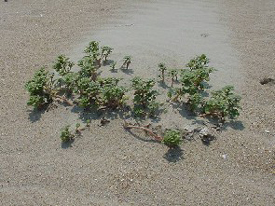Seaside amaranth facts for kids
Quick facts for kids Seaside amaranth |
|
|---|---|
 |
|
| Conservation status | |
| Scientific classification |
|
| Kingdom: | Plantae |
| Clade: | Tracheophytes |
| Clade: | Angiosperms |
| Clade: | Eudicots |
| Order: | Caryophyllales |
| Family: | Amaranthaceae |
| Genus: | Amaranthus |
| Species: |
A. pumilus
|
| Binomial name | |
| Amaranthus pumilus |
|
| Script error: The function "autoWithCaption" does not exist. | |
Script error: No such module "Check for conflicting parameters".
The seabeach amaranth (Amaranthus pumilus) is a special type of plant called an amaranth. It's an annual plant, which means it lives for only one growing season. This plant used to grow all along the eastern coast of the United States. Sadly, it is now a threatened species, meaning it's in danger of disappearing.
Contents
Where the Seabeach Amaranth Lived
The seabeach amaranth once grew widely from South Carolina all the way up to Massachusetts. It was first found in New Jersey. However, by 1913, it had disappeared from that state. Today, this plant is gone from about two-thirds of the areas where it used to grow. Sometimes, it has reappeared in places where it had vanished before. This can happen when its habitat improves after being damaged by things like building or beach activities.
What the Seabeach Amaranth Looks Like
This plant has many stems that grow low to the ground. Its leaves are thick and fleshy. A large seabeach amaranth plant can have hundreds of stems and cover an area of about one meter (about three feet). Its yellow flowers are small and hard to see. However, the plant produces many seeds in July. These seeds can stay alive for a very long time. This might be why the seabeach amaranth can sometimes reappear in places where it had disappeared.
Where the Seabeach Amaranth Lives
You can find the seabeach amaranth on sandy beaches. It especially likes to grow on barrier islands. It grows best at the bottom of dunes, just above the high-water mark. Even though other beach plants grow nearby, the seabeach amaranth does not like to be too close to most of them. The only plant it tolerates is the American sea rocket. This plant is important for the beach ecosystem. It helps to gather sand around itself, which then helps to form new dunes.
Why the Seabeach Amaranth Needs Help
In 1993, the seabeach amaranth was officially listed as a threatened species in the United States. There are only about 50 groups of these plants left. It is considered gone from Connecticut. It is listed as threatened in North Carolina. It is also listed as endangered in Maryland, New Jersey, New York, and Rhode Island.
The biggest dangers to this plant are things that disturb its beach home. These include building new houses or shops, building seawalls, and people driving off-road vehicles on the beach. In North Carolina, oil left on the beaches from ships sunk during the World Wars also caused many seabeach amaranths to die.
See also
 In Spanish: Amaranthus pumilus para niños
In Spanish: Amaranthus pumilus para niños
 | Jackie Robinson |
 | Jack Johnson |
 | Althea Gibson |
 | Arthur Ashe |
 | Muhammad Ali |


